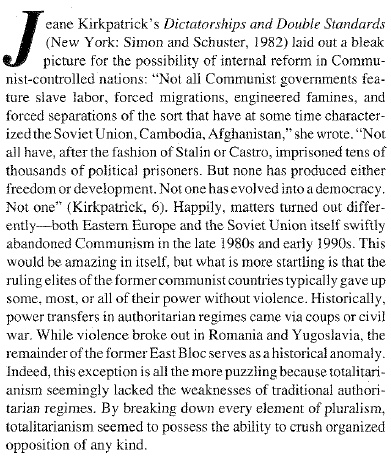Two decades ago, I spent my summer writing my first academic article. Topic: “The Literature of Nonviolent Resistance and Civilian-Based Defense” (Humane Studies Review, 1994). I’m still happy with the result. The piece begins by noting that conservatives’ prognosis for Communism was far less insightful than conservatives’ diagnosis of Communism:
My favorite section:


READER COMMENTS
david
Jul 3 2013 at 1:35am
Survivorship bias…?
Arthur_500
Jul 3 2013 at 12:37pm
Governments are not always the repressive power. the Black Civil rights movement in the United States is one example. Certainly we had the repression of local and State governments but there was also the animosity by many in the non-black population as well as organized repression from the KKK.
Non-violent resistance brings awareness but increases the resolve of those opposed to the desired change. However, at that point there needs to be adequate defense of the lives who are resisting in a non-violent manner.
With the Civil Rights actions in the South a major turning point was when War Veterans took up arms to defend the places where voter registration was taking place. Only then did violence stop (at those locations) and the continuation of non-violent actions could continue.
At the end of the day I fail to believe the most civilized society will fall to what we would consider non-violent protest/ change without the “shield” of protection sitting in the background.
Of course, if we read “The Turning Point” and look at American Society in the past 80 years one could think we have changed American Society in a non-violent manner through the use of the education system to brainwash several generations of students to reach the utopia of “Idiocracy” which we seemed to have achieved.
Patrick R. Sullivan
Jul 3 2013 at 1:24pm
The post misrepresents (or misunderstands) Kirkpatrick’s argument in D&DS. The claim that communist dictatorships don’t transform themselves is only that they hadn’t up to that point. Which was correct. But, that was only a throw away line, not the thesis of her lengthy Commentary Magazine article.
Read it for yourself and see. Btw, she made it in November 1979, just after the Shah had fallen, not 1982. She was criticizing just about every aspect of Carter’s foreign policy (its raison d’etre). Obviously that changed when Reagan was elected, and moved to confront the Soviet Union; he was not ‘over his inordinate fear of communism’. And, Reagan’s approach worked.
Comments are closed.